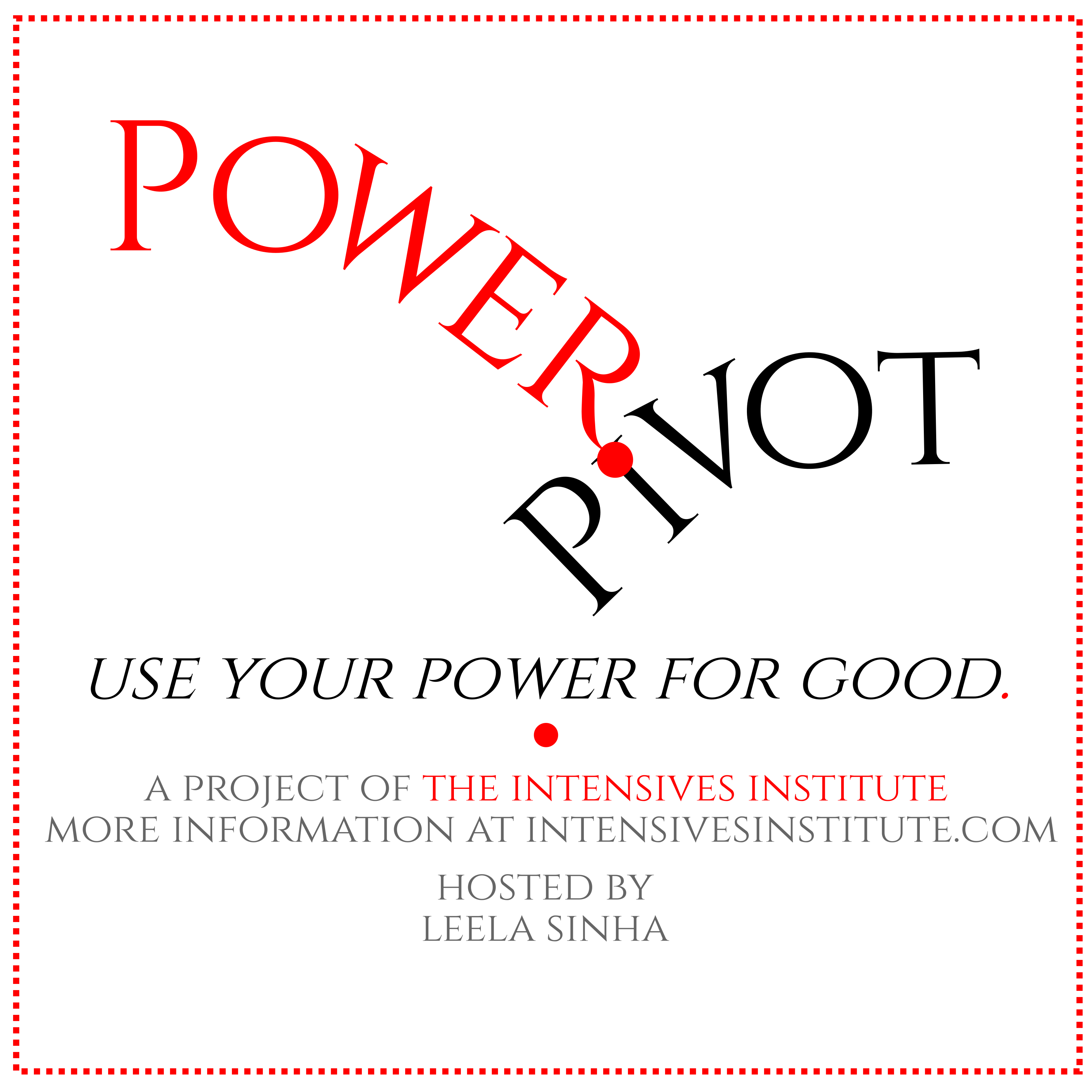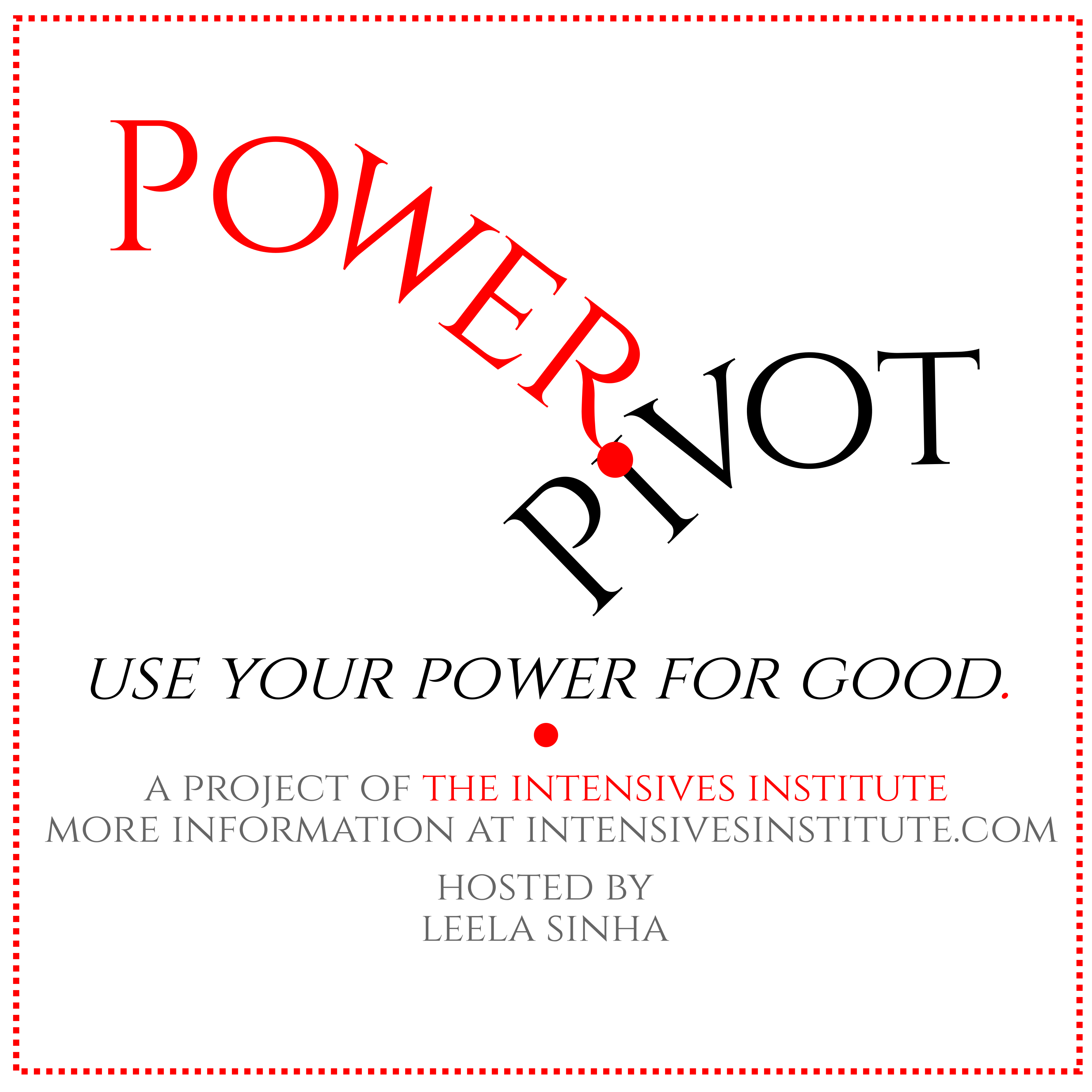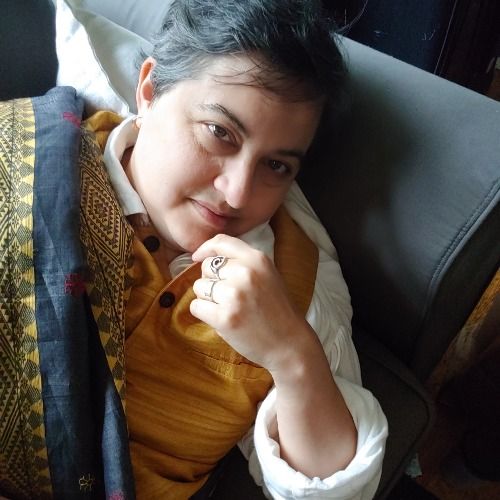Episode 4
Vow of Prosperity
How shall we be in integrity while holding power? And what does that mean? That's the question.
Transcript
So I've been thinking about vows. I've been
Leela Sinha:thinking about vows because one of my teachers had us go through
Leela Sinha:this process where we released vows that were not serving us,
Leela Sinha:that we might have made by inadvertent processes in the
Leela Sinha:early parts of our lives. And, whoooo, was that powerful? I
Leela Sinha:wasn't surprised, of course, it was powerful. How could that
Leela Sinha:work not be powerful. And, you know, sometimes when you release
Leela Sinha:something, you can just let it be released. And that's it, it's
Leela Sinha:like a bird, it flies away, no problem. Other times, when you
Leela Sinha:release something, you're left with something, you're left with
Leela Sinha:a hole, it removes itself from a space, and you have to decide if
Leela Sinha:that space is just going to get kind of healed over. Like if you
Leela Sinha:have a tooth pulled, or if you're going to put something
Leela Sinha:back in that space. We learned in science when I was, I don't
Leela Sinha:know, in seventh grade or so that nature hates a vacuum. As
Leela Sinha:it turns out, that's very true. Any open space will eventually
Leela Sinha:be filled in by something. And so the question that I've been
Leela Sinha:thinking about and wrestling with and praying on this morning
Leela Sinha:is what happens when we release some of those really deep,
Leela Sinha:ingrained vows, especially ones around things like money and
Leela Sinha:power. And specifically, I got to thinking about vows of
Leela Sinha:poverty. Now, vows of poverty, historically, very connected to
Leela Sinha:religious practice, across different faiths, many vowed
Leela Sinha:religious people make a vow of poverty, and they make a vow of
Leela Sinha:poverty, to devote themselves more fully to the work of the
Leela Sinha:Spirit. That's, that's the usual shape of the thing. And the idea
Leela Sinha:is not that they are so poor that they can't eat or can't
Leela Sinha:have a place to sleep. The idea is that the church, the
Leela Sinha:religious institution of one kind, or another, takes care of
Leela Sinha:them. And they, in turn, devote their time and energy and
Leela Sinha:talents and spirit, to the relationship with the sacred.
Leela Sinha:And to this kind of religious leadership. And there are lots
Leela Sinha:of good reasons why that's true. It's easier if you don't have
Leela Sinha:any other commitments, to devote yourself to a community or to a
Leela Sinha:tradition. And it does sort of help focus you because there's
Leela Sinha:nothing else. Right. So there are things that people do, there
Leela Sinha:are reasons that people make, deliberate vows of poverty that
Leela Sinha:makes sense in context. So I'm not, I'm only thinking about
Leela Sinha:those as the beginning point. Because I think, I know I have,
Leela Sinha:I know a lot of other people, especially people, liberal
Leela Sinha:people, have made similar vows, but kind of by accident; looking
Leela Sinha:around seeing at the kinds of destruction that wealth and
Leela Sinha:power have wrought on our world. And deciding that, you know, in
Leela Sinha:the, in the common parlance, "eat the rich," right, that that
Leela Sinha:there is some level of wealth above which wealth is immoral.
Leela Sinha:And I don't actually have an argument with that, I think
Leela Sinha:there is a level of wealth above which, there's no way to have
Leela Sinha:accrued it without causing immense harm. And I don't want
Leela Sinha:to be part of something that causes immense harm. However,
Leela Sinha:there's a lot of space between that and poverty. And we live in
Leela Sinha:a world at this point where nobody, and I mean, nobody
Leela Sinha:should be going without housing without food, without clothing,
Leela Sinha:without their basic needs met, like that should just be a
Leela Sinha:given. And it's not. And that, that's a gut punch every time I
Leela Sinha:think about it. And also, there are a lot of people who are
Leela Sinha:between those two poles.There are a lot of folks who have
Leela Sinha:some, but not really enough to get by. They're making it but
Leela Sinha:they're making it by the skin of their teeth. And I have been in
Leela Sinha:that position in my lifetime over and over and over. So I'm
Leela Sinha:thinking about this in a very personal way. Well, what does it
Leela Sinha:mean? What does it mean to accidentally swear that you're
Leela Sinha:never gonna be rich, because rich people are bad? Because
Leela Sinha:that's what we do. And then I was thinking about, well, there
Leela Sinha:must be, as there are, right, when I think about intensives
Leela Sinha:and expansives, I figured out who intensives were and then I
Leela Sinha:was like well, there must be another end to this spectrum. So
Leela Sinha:if there are people who inadvertently make vows of
Leela Sinha:poverty, there must be people also in our world who are
Leela Sinha:inadvertently making vows of prosperity,
Leela Sinha:and I don't mean Prosperity Gospel, like, let's just not
Leela Sinha:even, I'm not even going there. You can look it up on Wikipedia
Leela Sinha:if you want. But that is not what I'm talking about. But,
Leela Sinha:people who, in the going about their lives, either because
Leela Sinha:their families were prosperous, or because their context was not
Leela Sinha:prosperous, and they were not doing that, make a vow of
Leela Sinha:prosperity, they make a vow that that is never going to be them,
Leela Sinha:that they are going to rise up from that position, to a place
Leela Sinha:of prosperity. And stay there. I think a lot of immigrants do
Leela Sinha:this. I'm pretty sure my father did this. But I think a lot of
Leela Sinha:people who aren't immigrants do this, too. I think that there is
Leela Sinha:a stratum where about half the people make a vow of poverty
Leela Sinha:because they're so hurt and angry at what wealth has done in
Leela Sinha:our world, and the other half make a vow of prosperity because
Leela Sinha:they are not about to get trapped under the boot of class
Leela Sinha:inequality. So I've been thinking like, what would it
Leela Sinha:mean for me to take a vow of prosperity? What would it mean
Leela Sinha:for me to take a vow of prosperity? And by thinking I
Leela Sinha:mean, it came to me in prayer, and then I had to think about
Leela Sinha:it. But you don't have to arrive there that way. You can get
Leela Sinha:there by straight-up logical means. What does it mean to take
Leela Sinha:a vow of prosperity. And this got me thinking about power and
Leela Sinha:the intersection of power and money, which, as some of you
Leela Sinha:know, is a big deal to me, I think about it a lot. When you
Leela Sinha:take a vow of poverty, you are relinquishing access to a
Leela Sinha:particular kind of power. Not all power, but you are
Leela Sinha:relinquishing access to the power that comes with having
Leela Sinha:money in what we live in, which is a capitalist society. You may
Leela Sinha:be gaining other kinds of power, or not, depending on your
Leela Sinha:community, depending on the context of power. But you're
Leela Sinha:definitely relinquishing access to that particular power that
Leela Sinha:comes with wealth. So when you take a vow of prosperity, first
Leela Sinha:you have to define prosperity. Is it about money? Is it about
Leela Sinha:other kinds of resources, social prosperity? Is it about... is it
Leela Sinha:about resource prosperity? What is the vow really? Because
Leela Sinha:prosperity is this kind of amorphous word where we
Leela Sinha:understand poverty to be very closely linked to money, we
Leela Sinha:don't really think about what that means on the other side. So
Leela Sinha:first, I'm thinking about like, what would prosperity mean to
Leela Sinha:me? I have so much prosperity already. I have lots of
Leela Sinha:prosperity, just not to do with money. But I have prosperity
Leela Sinha:when it comes to that kind of prosperity when it comes to
Leela Sinha:social context. I have prosperity when it comes to
Leela Sinha:resources. I have prosperity when it comes to the resources
Leela Sinha:that come from social context. I have deep and abiding
Leela Sinha:relationships that help to hold me up, that offer me shelter,
Leela Sinha:that offer me care, that offer me a buffer that other people
Leela Sinha:don't have. So what would prosperity mean? What would a
Leela Sinha:vow of prosperity mean? How would it be different from
Leela Sinha:what's happening right now? Where would I be directing it
Leela Sinha:and then, and then it's about thinking about this power piece.
Leela Sinha:Because if you vow, poverty, you're removing something. But
Leela Sinha:when you vow, prosperity, you're vowing access to, whether or not
Leela Sinha:you access it, you're vowing access to that particular kind
Leela Sinha:of power that comes from prosperity. You're vowing access
Leela Sinha:to resources, you're vowing access to a bunch of stuff. And
Leela Sinha:most of us who make inadvertent vows of poverty, do so at least
Leela Sinha:in part, because we don't want to be like somebody else, or
Leela Sinha:some other institution, or some entity that we've seen be evil
Leela Sinha:with power that we perceive having come from money. So what
Leela Sinha:happens instead, when we vow prosperity, and access to those
Leela Sinha:kinds of power, whether we choose to access them or not.
Leela Sinha:We're vowing access to those kinds of power. And immediately
Leela Sinha:it becomes obvious to me that you can't make that, I can't
Leela Sinha:make, a vow of prosperity in integrity, in isolation. Because
Leela Sinha:prosperity happens in community, prosperity happens
Leela Sinha:as a result of community, of interaction of resources, of
Leela Sinha:things that are not actually mine. But things that I might
Leela Sinha:have access to for a while. And prosperity brings with it this
Leela Sinha:power. And so there needs to be a vow, or several vows, that go
Leela Sinha:with it. Vows like integrity, vows like kindness, vows like
Leela Sinha:generosity, in order to ensure, to the greatest extent possible,
Leela Sinha:that prosperity is not a corrupting force. Because I
Leela Sinha:think that's what we're mostly afraid of, is that we will be
Leela Sinha:corrupted by it. We will be corrupted in its presence. We
Leela Sinha:will be corrupted, and then we will wield the power that we got
Leela Sinha:from the prosperity for less good ends, or for bad ends. And
Leela Sinha:the only way, the only way to mitigate that possibility,
Leela Sinha:because it's a real possibility, we can't turn away from it. When
Leela Sinha:we are deliberately accruing power in some way or other,
Leela Sinha:including via prosperity, then we have to engage the questions
Leela Sinha:of kindness and generosity. We have to engage the questions of
Leela Sinha:integrity, how will we stay in integrity when we have power?
Leela Sinha:And that's the question isn't it? So often, when people rise
Leela Sinha:to power their integrity cracks, and people who were amazing lose
Leela Sinha:some of their shine. I don't know a single person who wants
Leela Sinha:to be that person. I do know people who have been that
Leela Sinha:person. I don't want to follow in their footsteps. So
Leela Sinha:how, how will we stay in integrity? How shall we be in
Leela Sinha:integrity while holding power? And what does that mean? That's


